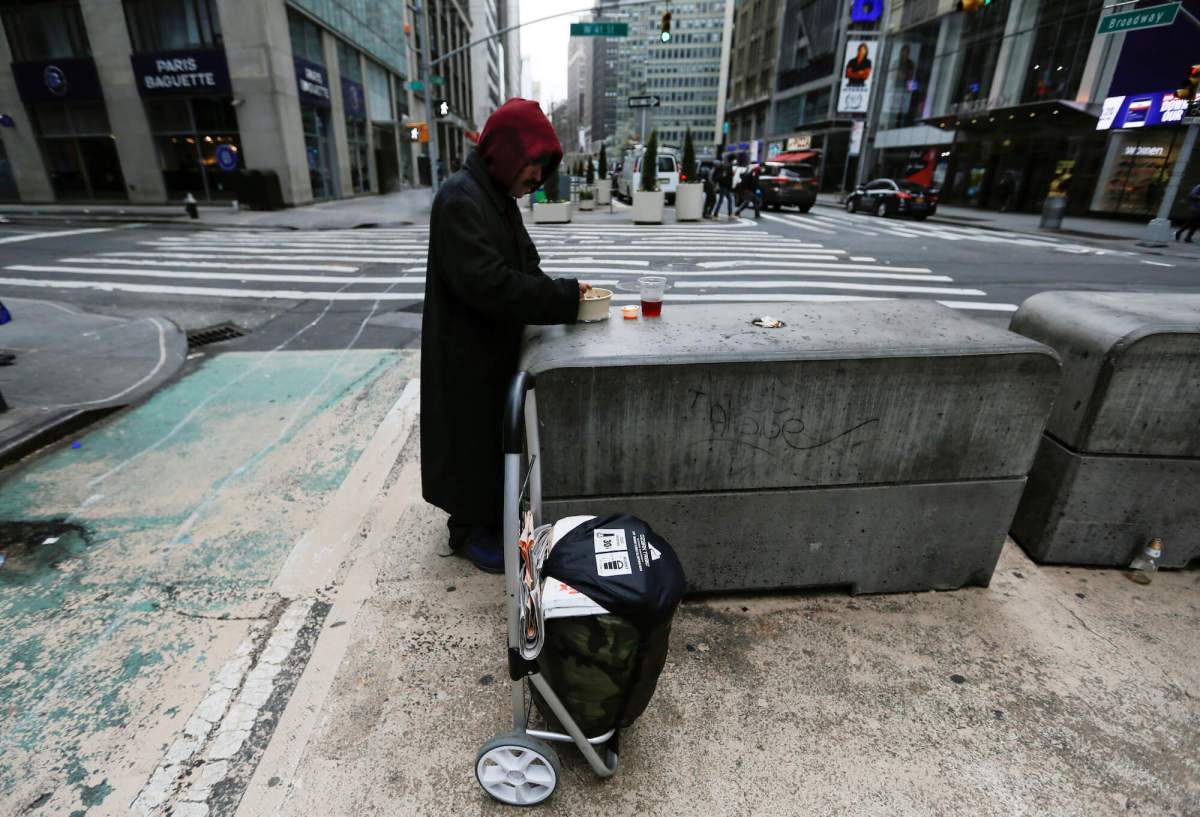BY MATT TRACY
The hashtag #HomelessCantStayHome is sweeping through social media and a growing slate of elected officials and advocacy groups are escalating their calls for the city to house the homeless in vacant hotel rooms to prevent the spread of coronavirus, adding pressure on Mayor Bill de Blasio and Governor Andrew Cuomo to take swift action.
In response, the city is claiming it is taking steps to isolate those who are homeless — but it appears only a small fraction of those whom advocates say could benefit from relocation will actually be rescued.
Voices Of Community Activists & Leaders (VOCAL-NY), a grassroots organization dedicated to eradicating homelessness and HIV/ AIDS, has been among the leading groups focused on marginalized individuals during the crisis and is at the forefront of the movement to transfer homeless individuals to hotels so folks do not face such high risk of infection.
The organization has called for proper treatment of homeless individuals and the release of incarcerated folks, two demographic groups that face elevated risks of coronavirus due to cramped living environments.
Many others have also called on the city to house homeless folks in hotels, including out gay Council Speaker Corey Johnson and Public Advocate Jumaane Williams.
“The homelessness crisis is only further complicated by #COVID19,” Johnson wrote in a tweet. “We must protect our fellow New Yorkers and move them off the streets/ out of shelters into vacant hotel rooms to help #StopTheSpread, + cease all enforcement sweeps on the subways and streets. #HomelessCantStayHome.”
A virtual press conference was held on April 7 to rally support for the effort to house homeless New Yorkers in 30,000 of 100,000 vacant hotel rooms. The video conference presser featured VOCAL-NY, Communities United for Police Reform, human.nyc, a group focused on street and subway homeless people, and elected officials including Williams, Councilmembers Donovan Richards of Queens, Brad Lander of Brooklyn, and Antonio Reynoso of Brooklyn and Queens, and Manhattan Assemblymembers Yuh-Line Niou and Harvey Epstein, among others.
“We are simply asking for 30,000 of those [100,000] hotel rooms to help ease the congestion in shelters, where we have upwards of 60,000 people who are homeless, not to mention people who are homeless in the street,” Williams said during the presser.
Furthermore, more than 100 health professionals, including more than 50 who work in the greater New York City area, signed an open letter to de Blasio and Cuomo citing the 84.8 percent vacancy rate in city hotels and stressing, “We must immediately prioritize offering all homeless individuals on the streets and in congregate shelters the opportunity to move into private hotel rooms to slow the spread of COVID-19.”
The concerns about coronavirus risk in shelters are not new. Kate Barnhart of New Alternatives, which serves queer homeless youth, sounded the alarm in an interview with Gay City News last month when she said “there is no way to isolate people [at shelters] if someone should become sick.” She said at the time that staff at Trinity Place — a shelter for homeless LGBTQ youth — were told that residents would be sent back to shelters after stints in the hospital, even if there was a lack of space for isolation.
In the following weeks the virus decimated homeless shelters across the city. Department of Social Services spokesperson Isaac McGinn told Gay City News on April 9 that 299 homeless individuals have tested positive for coronavirus in New York City, including 269 people who are in 101 different homeless shelters. Of the 299 homeless individuals who have tested positive, 15 people have died — and in a city where many people have not been able to get tested, those numbers could actually be even higher.
The New York Post reported on April 6 that the city has started housing hundreds of homeless individuals with the coronavirus or symptoms of the virus in rooms across five hotels. The Department of Social Services confirmed the use of hotels and said the city has moved to utilize hundreds of units — with more forthcoming — across five locations in the city to house individuals who have symptoms but do not need to be hospitalized, as well as taking steps to relocate those who could be especially vulnerable to the virus. The city would not elaborate on who they classify as vulnerable beyond seniors.
“As this situation evolves each day, we’re adapting and responding: connecting clients who need it to care, opening hundreds of isolation units for recovery, implementing best practices in shelters citywide to increase social distancing and limit gatherings, and now strategically transferring some of our most vulnerable clients, starting with those over 70, to dedicated sites within our system for their safety during this crisis out of an abundance of caution,” McGinn told Gay City News in a written statement.
The hundreds of units would be significantly less than the 30,000 rooms that have been requested by Williams and elected officials and advocates.
A spokesperson for Cuomo did not immediately return requests for comment for this story.
This story first appeared on gaycitynews.com.
































